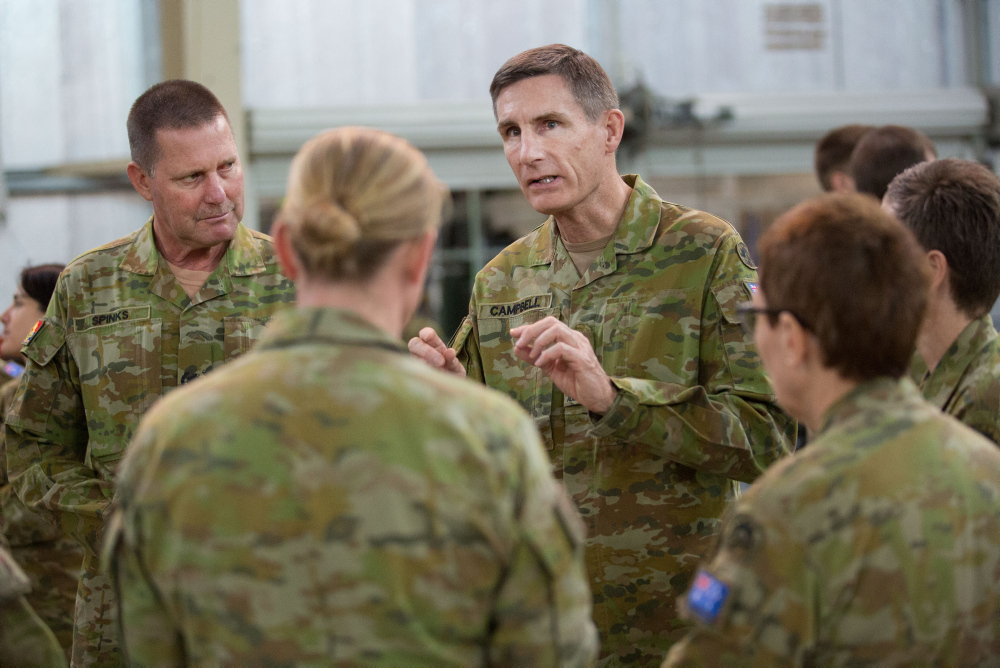ADF women are already ‘in combat’
Posted By Brendan Nicholson on March 24, 2017 @ 06:00

This article is part of a series on ‘Women, Peace and Security’ that The Strategist is publishing in recognition of International Women’s Day 2017.
Lieutenant General Angus Campbell, the first Special Forces officer to command the Australian Army, wants more women in his combat units in order to make those units smarter.
‘To me it’s all about talent,’ Campbell tells The Strategist. ‘I don’t have enough of it and I want more. I am not drawing on the full potential of the population. I can’t possibly imagine, therefore, that the Army is as smart as it could be and as it needs to be.’
That army, he says, is modestly sized, with 30,000 full-time and 15,000 part-time soldiers. ‘If you’re small, you need to be smart. If you’re drawing on the talents and skills and energy of the breadth of the Australian population, you’ve got your best chance of being as smart as you possibly can be.’ Women make up 12.4% of the full-time Army and 13.5% of the part-time force.
Campbell says the experience of the infantry in Western armies indicates that Australia could in time have about 80 women in combat roles in infantry units. ‘That’s 80 women dispersed over seven infantry battalions. I’m very comfortable with that. I don’t mind how many women join the infantry other than that they pass the physical employment standard (developed by the Defence Science and Technology Group) and that they are volunteers,’ Campbell says.
‘And I don’t mind how many women join any other part of the force because I know the more competition there is for employment, the more I have to choose from and the greater will be the talent and skills and abilities of the Army.’
On a visit to an infantry company in Afghanistan, Campbell asked the young Australian men how many local women they’d spoken to. ‘The answer, of course, was none.’ That’s a practical disadvantage, he says, of having all-male combat forces there.
Male and female soldiers operating together worked more effectively with local communities and the Army found other ways to bring women into that environment. ‘But it’s easier when you don’t have to think about doing something extra because inherently your force is designed to have the most powerful effect that the Australian people, through its army and its defence force, can generate.’
Female soldiers were deployed deliberately to balance the all-male composition of the infantry companies and there was much more engagement with women in the villages, Campbell says. There would be either no engagement or the most cursory engagement otherwise. ‘I think on occasions we got information that was of value to us and that was the very point of deliberately designing women into our scheme of manoeuvre.’
It’s crucial to put the most effective force into the field, he says. ‘In a culture where it’s routinely forbidden for women to have interaction with males not of their family, having women involved in your operations has a very powerful effect.’
The Canadian Army in Afghanistan found local women were much more likely to approach a patrol if it contained female soldiers and on occasions they warned the Canadian women about bombs or ambushes on the road ahead.
Until 2013, 93% of ADF tasks were open to women, but they weren’t allowed to serve as ‘front-line’ infantry or in Special Forces, where they might be involved in close combat, in armoured or artillery units or in some areas where materials toxic to unborn children were used. Nor could they serve as Navy mine clearance divers or as RAAF airfield defence guards.
That changed in January 2013, when all of those positions were opened up to women who could meet the physical standards.
In the wars the ADF is now involved in, anywhere can become the ‘front lines’ and the many Australian women who’ve served on dangerous operations must be bemused by occasional suggestions that they aren’t already ‘in combat’.
Warfare in places such as Afghanistan or Iraq can bring death or injury from any direction and it doesn’t discriminate. In August 2006, a female Australian soldier was wounded by a rocket which hit her base in Baghdad.
And when the Army’s big Chinook helicopters blasted through Afghan valleys carrying Special Forces to attack an insurgent base, their pilots included women.
The combat medic crouching over a wounded soldier 100m behind a firefight involving coalition troops could well have been an Australian woman. Armoured troop-carrying vehicles in operational areas have long been driven by women who are as vulnerable to bombs as any other soldier. In Afghanistan and Iraq, any routine road convoy could become a serious military operation.
Female crew on the Australian frigates in the 55C heat of the Persian Gulf or on counter-piracy operations off the Horn of Africa regularly go on boarding parties to search suspect ships. Sailors in their fast, rigid inflatable boats are heavily armed and alert for an ambush. In 2004, three US sailors were killed during such an operation when terrorists blew up a vessel. The Americans were under Australian command and the boarding party could easily have come from an Australian ship. Women also serve in the Navy’s submarines on intelligence-gathering operations.
And when the RAAF’s twin-seat Super Hornet strike aircraft fly missions in Iraq, some of their crew members are women. Soon, RAAF fast jets will be piloted by women.
‘But we’re not there yet,’ says Campbell of the Army, ‘there’s more work to be done.’
Article printed from The Strategist: https://www.aspistrategist.org.au
URL to article: https://www.aspistrategist.org.au/adf-women-already-combat/
Click here to print.